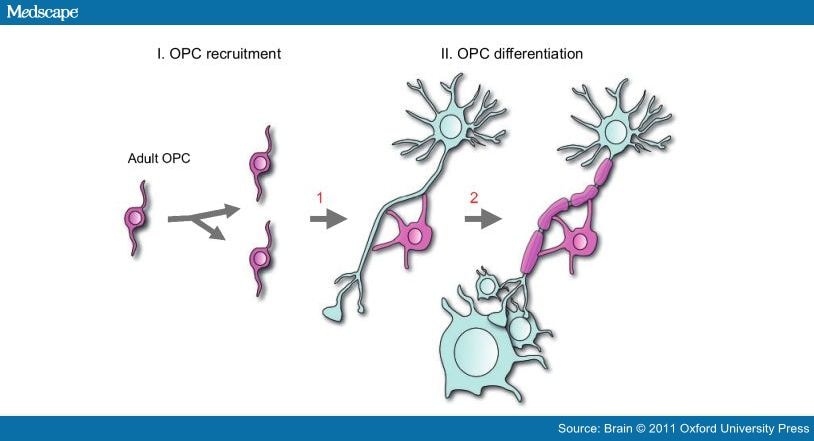Nakatani et al. Ascl1/Mash1 Promotes Brain Oligodendrogenesis during Myelination and Remyelination.mJ Neurosci. 2013 Jun 5;33(23):9752-9768.
Oligodendrocytes are the myelin-forming cells of the CNS. They differentiate from oligodendrocyte precursor cells (OPCs) that are produced from progenitors throughout life but more actively during the neonatal period and in response to demyelinating insults. An accurate regulation of oligodendrogenesis is required to generate oligodendrocytes during these developmental or repair processes.
We hypothesized that this regulation implicates transcription factors (things that initiate or help turn genes into proteins) , which are expressed by OPCs and/or their progenitors (immature myelinating cells). Ascl1/Mash1 is a proneural (something that helps promote nerves) transcription factor previously implicated in embryonic oligodendrogenesis (production of myelinating cells during development) and operating in genetic interaction with Olig2 (a molecule involved in the development of myelin making cells), an essential transcriptional regulator in oligodendrocyte development. Herein, we have investigated the contribution of Ascl1 to oligodendrocyte development and remyelination. During the neonatal period (time period after birth), Ascl1 expression was detected in progenitors of the cortical subventricular zone (a place where nerve stem cells come from) and in OPCs. Different genetic approaches to delete Ascl1 in cortical progenitors or OPCs reduced neonatal oligodendrogenesis, showing that Ascl1 positively regulated both OPC specification from subventricular zone progenitors as well as the balance between OPC differentiation and proliferation. Examination of remyelination processes, both in the mouse model for focal demyelination of the brain and in multiple sclerosis lesions in humans, indicated that Ascl1 activity was upregulated along with increased oligodendrogenesis (production of myelin forming cells) observed in remyelinating lesions. Additional genetic evidence indicated that remyelinating oligodendrocytes derived from Ascl1+ progenitors/OPCs and that Ascl1 was required for proper remyelination. Together, our results show that Ascl1 function modulates multiple steps of OPC development in the postnatal brain and in response to demyelinating insults.
In short yet another molecule has been found that can influence the growth and maturation of myelin forming cells. So another small step towards understanding myelin repair.
